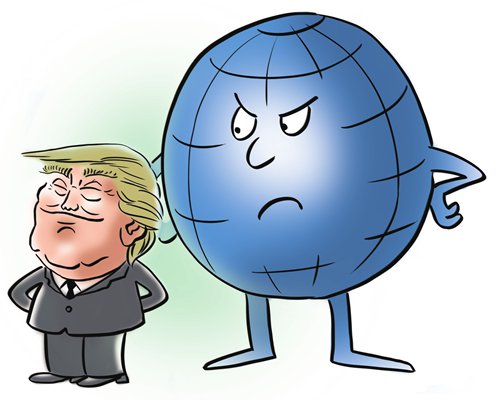
Illustration: Liu Rui/GT
The theme of the World Economic Forum annual meeting 2018 - "creating a shared future in a fractured world" - shared Chinese President Xi Jinping's vision of "building a community with shared future for mankind" that he put forward in last year's meeting.
One year on, Xi's concept has conformed to the trend of development of the times and received wide acclaim from the international community. It reflects the profound oriental philosophy that is enlightening and thought-provoking.
The diplomatic concept of building a community with shared future for mankind originates in traditional Chinese culture. In China, the idea of "harmony but not sameness" has been widely accepted. On the diplomatic level, it strives to build a community with shared interests, responsibility and destiny featuring mutual respect, cooperation and a win-win situation by "seeking common ground while reserving differences," mutual tolerance, harmony and common development between states. It emphasizes that nations should seek understanding through dialogue, resolve conflicts through consultation and settle disputes through negotiation.
The proposal of "a community with shared future for mankind" reflects common development and is in line with the common aspiration for economic progress of the people of all countries.
Shortly after Xi put forward the concept, he envisioned in his UN address at Geneva a path to achieve the goal by calling on the international community to promote partnership, security, growth, inter-civilizational exchanges and the building of a sound ecosystem. This shows China's pragmatic diplomacy. Over the past year, China has taken concrete steps to implement the concept.
On many diplomatic occasions including the G20 Hamburg summit, the APEC Economic Leaders' Meeting in Da Nang, Vietnam, the Belt and Road Forum for International Cooperation and the CPC in Dialogue with World Political Parties High-Level Meeting, China has projected the image of a major responsible power and contributed to common prosperity and progress of the human society.
In contrast, the America First policy promoted by US President Donald Trump focuses on the US' own interests. The policy implies the abandonment of any domestic or foreign policy that is not in the US interest.
As shown by US withdrawal from the Trans-Pacific Partnership, the plan to build a wall along the border between the US and Mexico, the promulgation of the Muslim ban, the exit from the Paris accord, the abolition of an Obama-era program called Deferred Action for Childhood Arrivals, and the withdrawal from the UNESCO, "America First" is based on narrow-minded egoist diplomatic thinking. It only thinks about US interests and does not show responsibility toward the world.
If the US keeps pushing forward "America First," it might very likely jeopardize the current international order and promote hegemony. If all Washington thinks about is its own interests in handling global affairs, it will inevitably affect the interests of other nations and thus result in conflicts and lead to global instability.
If all countries give priority to their own interests, the law of the jungle will prevail and the globe will plunge into turmoil.
As the most developed country, the US should have led people from all around the world in pursuit of common development. However, it chose a value which would affect the entire global order and have a negative influence on other countries.
By comparison, the China-initiated community of common destiny is more suitable for international development and the wishes of people worldwide. China's inclusiveness and commitment to the world will inevitably dwarf the narrow-minded "America First" policy.


